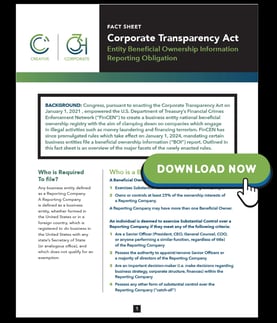UPDATE: March 15, 2024
On March 1, 2024 an Alabama federal Northern District Court* ruled in favor of a class of plaintiffs who argued that the FinCEN BOI reporting requirements are unconstitutional. In doing so, it enjoined FinCEN from enforcing the Corporate Transparency Act provisions against the Plaintiffs. Despite the ruling, FinCEN still requires compliance with the Corporate Transparency Act reporting requirements from all Reporting Companies outside of the class of plaintiffs in the Alabama federal court case. The Department of Justice filed a Notice of Appeal, on behalf of Department of Treasury, challenging the
decision on March 11, 2024. Further updates will be provided as this case develops.
* National Small Business United v. Yellen, No. 5:22-cv-01448 (N.D. Ala.)
Background of Beneficial Ownership Information Reporting Rule
Congress, pursuant to enacting the Corporate Transparency Act on January 1, 2021, empowered the U.S. Department of Treasury's Financial Crimes Enforcement Network (“FinCEN") to create a business entity national beneficial ownership registry with the aim of clamping down on companies that engage in illegal activities such as money laundering and financing terrorism. FinCEN has since promulgated rules which take effect on January 1, 2024, mandating certain business entities file a beneficial ownership information (“BOI”) report. Outlined in this blog post is an overview of the major facets of the newly enacted rules.
Who is Required to File a BOI Report?
Any business entity defined as a Reporting Company. A Reporting Company is defined as a business entity, whether formed in the United States or in a foreign country, which is registered to do business in the United States with any state’s Secretary of State (or analogous office), and which does not qualify for an exemption.
BOI Reporting Exemptions
Any business which qualifies for an exemption is not subject to the BOI reporting requirement. There are twenty-three (23) categories of exempted entities. These include banks, insurance companies, insurance agencies, public accounting firms, Exchange Act registered entities and large operating companies; defined as having more than 20 employees, $5,000,000 in gross receipts or sales and an operating presence in the United States.
.webp?width=715&height=471&name=US%20Capitol%20(2).webp)
What Information Must be Reported?
If you’ve determined that your entity is required to file a BOI report, you’ll need to report basic information about the entity, in addition to personal information for the entity’s Beneficial Owners and (for entities formed after January 1, 2024) Company Applicants. This includes:
- The full legal name of the entity
- Any trade names (DBAs)
- Complete US address
- Jurisdiction of formation/incorporation
- Federal employer identification number (FEIN) or taxpayer identification number (TIN)
The required Beneficial Owner and Company Applicant information includes:
- Full legal name
- Date of birth
- Complete current residential address*,
- Unique identification number and jurisdiction of issuance, and an image of a non-expired U.S. passport, driver’s license, state or tribal issued identification card, or, in the absence of any of the previous documents, a foreign passport.
*Company Applicants whose name appear on formation/incorporation documents solely on account of their role in the course of their business (e.g. paralegals) may report the entity’s business address in lieu of their residential address.
Who is a Beneficial Owner?
A Beneficial Owner is any individual who directly or indirectly:
- Exercises Substantial Control over a Reporting Company, or
- Owns or controls at least 25% of the ownership interests of a Reporting Company.
A Reporting Company may have more than one Beneficial Owner.
An individual is deemed to exercise Substantial Control over a Reporting Company if they meet any of the following criteria:
- Are a Senior Officer (President, CEO, General Counsel, COO, or anyone performing a similar function, regardless of title) of the Reporting Company
- Possess the authority to appoint/remove Senior Officers or a majority of directors of the Reporting Company
- Are an important decision-maker (i.e. make decisions regarding business strategy, corporate structure, finances) within the Reporting Company
- Possess any other form of substantial control over the Reporting Company (“catch-all”)
How and Where are BOI Reports Filed?
BOI reports must be submitted electronically to a secure, online portal which can be found on the FinCEN website.
When do BOI Reports Need to be Filed?
Reporting Companies in existence prior to January 1, 2024, have until December 31, 2024, to file an initial BOI report. Reporting Companies which are incorporated/formed after January 1, 2024, must file an initial BOI report within ninety (90) days of its incorporation/formation date; Reporting Companies which are incorporated/formed after January 1, 2025, must file an initial BOI report within thirty (30) days of its incorporation/formation date.
What Happens if I don’t File a BOI Report?
Reporting Companies (and their Senior Officers) which fail to submit timely required BOI reports are subject to civil and criminal penalties. Penalties will also be levied upon those who willfully provide, or attempt to provide, fraudulent information on a BOI report. Penalties may include a $500/day fine (for each day the violation continues) levied upon the entity and a $10,000 fine and/or up to two years imprisonment levied upon Senior Officers.
Download & share the BOI Fact Sheet
Have Questions?
The Beneficial Ownership Information Reporting Rule took effect January 1, 2024, and impacts many companies. Intended to help prevent and combat money laundering, terrorist financing, corruption, tax fraud, and other illicit activity, the rule imposes specific reporting requirements for companies that are deemed to be Reporting Companies. If you have any questions about your company’s status, or how to prepare and file your Report, please feel free to contact us.
This document is intended to alert impacted businesses of a new Federal filing requirement and offer an overview of the pertinent points thereof. It does not constitute legal advice; please consult a legal professional for advice specific to your organization.

.webp)
